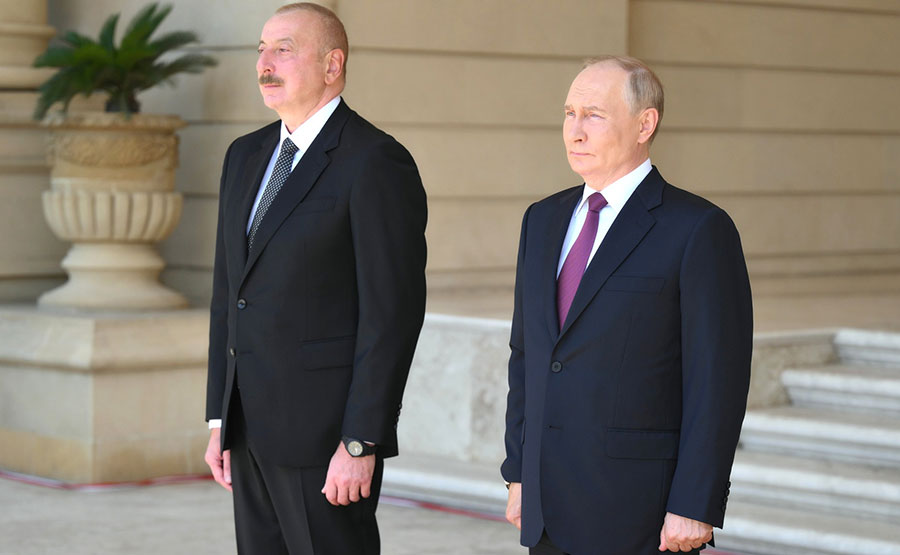by Suren Sargsyan
On August 18-19, Russian President Vladimir Putin visited Azerbaijan for two days, coinciding with ongoing battles in the Kursk region of Russia after the Ukrainian army invaded Russia. The official Kremlin statement proclaimed that discussions will focus on strengthening allied and strategic relations between Azerbaijan and Russia. Putin also addressed the peace process between Azerbaijan and Armenia with President Ilham Aliyev, a critical issue for Armenia.
In general, relations between Azerbaijan and Russia have grown closer since the onset of the war in Ukraine. According to official sources, Russians are the top source of visitors to Azerbaijan, with over 600,000 arrivals in 2023. Russia accounts for two-thirds of Azerbaijan’s foreign trade turnover with CIS countries around 4.4bln USD annually. Furthermore, Russia-Azerbaijan relations are experiencing dynamic growth in all directions.
For Russia, selling gas to European Union countries through Baku became crucial after sanctions halted direct sales, forcing Moscow to rely on intermediaries. As Kiril Krivosheev argues, “Russian exports of oil and gas through Azerbaijan rose significantly after Russia lost access to much of the European market following the invasion of Ukraine. This means that in winter, Azerbaijan can export more of its own gas and meet internal demand with Russian gas.
Read also
“Similarly, Russian oil exports to Azerbaijan quadrupled in 2023. In both cases, the total volume of exports is not huge, but the war in Ukraine means it is of disproportionate significance for Moscow. Azerbaijan has also become an irreplaceable partner for Russia when it comes to transporting goods to and from Iran and the ports of the Persian Gulf. It’s no coincidence that transport along the North–South Corridor was one of the main points of discussion between Putin and Aliyev at their April 2023 meeting.”

Suren Sargsyan
So, Baku effectively has been supporting Moscow in this situation. Along the same lines, during the meeting with Aliyev in Baku, Putin mentioned that discussions can take place not only about energy but also about industrial cooperation, transportation, logistics, and light industry.
In recent years, a geopolitical shift influenced by Russia’s strategic plans was not properly recognized in Armenia, leading to the current circumstances. In February 2023, Azerbaijan and Russia signed a strategic alliance agreement, formally acknowledging Azerbaijan’s importance to Russia, a reality already recognized in practice. On the other hand, Yerevan ceased to obstruct the strategic development of Moscow-Baku relations. In fact, the landscape of Russian-Azerbaijani relations dramatically changed after the 2020 war, when Turkey’s ally Azerbaijan defeated Russia’s ally Armenia.
The strategic alliance between Yerevan and Moscow was effectively damaged, allowing Russia to engage more freely with Baku, without fear of creating complications with Yerevan. Russia, preparing for the war in Ukraine, sought to avoid additional tensions in the South Caucasus and minimize Turkey’s influence in Baku and the broader South Caucasus region. Simultaneously, Moscow aimed to maintain its position in the South Caucasus, especially after losing its role as a mediator in Armenian-Azerbaijani negotiations when Yerevan and Baku began direct talks.
Russia’s possible involvement in the so-called Zangezur corridor appears unclear. Such involvement would provide Russia with a strategic foothold in the South Caucasus, but this prospect is opposed by Yerevan, Brussels, Tehran and Washington.
Let’s not forget that Georgia and Azerbaijan have a common border with Russia but Armenia does not. If Russia would have to choose, of course it would prioritize Baku and Tbilisi instead of Yerevan which has nothing else to give to Moscow.
It is also important to remember that after Russia’s invasion of Ukraine and the imposition of Western sanctions, Moscow halted gas exports to European countries. In response, Azerbaijan signed an agreement with the European Union and agreed to increase gas exports to supply European countries that were left without Russian gas. But in fact, Russia was supplying gas to Europe via Azerbaijan as Azerbaijan does not have as much gas as Russia has to cover European gas demand.
Coming back to the Baku meeting, Putin said, “Of course — we touched on this topic yesterday, and today we will continue — this concerns the resolution of the situation in the South Caucasus. It is clear and well-known that Russia is facing crises, including, and primarily, in the Ukrainian direction. But Russia’s historical involvement in the situation in the South Caucasus, especially in recent years, necessitates our participation in these events — of course, in the areas where it is desired by the parties, without a doubt. If we can do something to help achieve the signing of a peace agreement between Azerbaijan and Armenia, to move forward with border delimitation and demarcation, and to unblock the relevant logistics and economic routes, as we have discussed many times—we would be very glad to do so. Of course, after my visit to Azerbaijan, I will get in touch with Prime Minister [Nikol] Pashinyan to share the results of our talks. I know that Azerbaijan is focused on completing all procedures related to full resolution, this is well-known to me. We will discuss this.”
When I was writing this article, I was waiting to read the transcript of the conversation between the aforementioned Russian and Armenian leaders to gain some more information about the meeting in Baku. As of August 21, the telephone conversation did not take place or was done privately.
























































